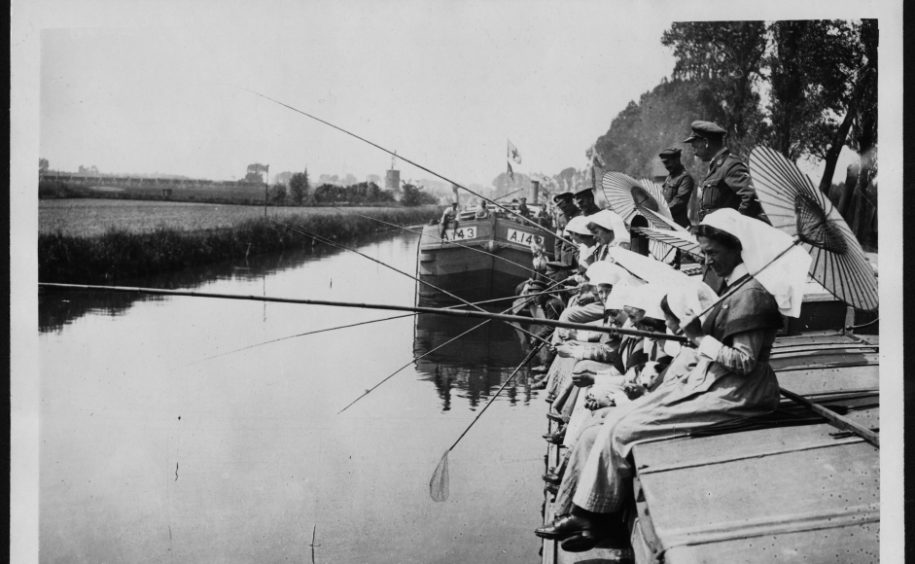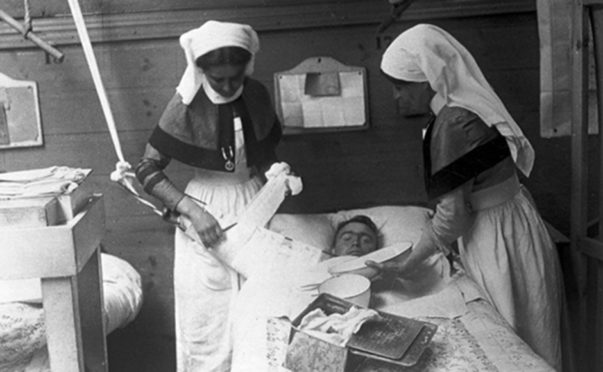A garden, dedicated to the memory of First World War heroes who served on floating hospitals, has been officially opened in Edinburgh.
Located in the grounds of Polwarth Parish Church on the banks of the Union Canal, the Peace Garden honours brave nurses and others who evacuated wounded military personnel on barges along canals in Belgium and France during the Great War.
Vessels were requisitioned and converted to hospitals, each with 30 beds.
The nurses worked in dangerous conditions to treat people with serious injuries, travelling in flotillas of six barges piloted by engineers from Britain’s Inland Waterways.
They transported the wounded to hospital bases in towns including Boulogne and Rouen and were regularly exposed to aerial bombardments because they could only travel by daylight. They also faced the risk of inhaling toxic gas fumes which clung to patients’ clothes and hair.
The Peace Garden is the brainchild of Professor Yvonne McEwen, director of Scotland’s War 1914-1919, an organisation established to advance and disseminate knowledge of the country’s role in the conflict.
It features a stone bench, a commemorative plaque and is complemented by an exhibition of beautiful photographs of barge medical staff in the church’s Drennan Hall.
The historic images have been loaned by the National Library of Scotland and the exhibition includes a diary written by Sister Millicent Bruce Peterkin from Edinburgh Royal Infirmary.
She wrote: “Undoubtedly one of the greatest drawbacks to the barges was the want of windows on the sides, which would have given us more light and air.
“The lack of air became most apparent during the last few months of the war.

“This was especially so if the load consisted of gassed cases for, notwithstanding the fact that they were supposed to be washed all over and have their gassed uniforms removed in hospital, they still seemed to constantly exude the smell of the gas.
“Frequently, also, they were badly burned and covered with huge watery blisters, which, when burst, seemed to smell badly.
“More than once, after evacuating such a load, I felt myself quite ‘gassed’ myself with sore eyes, sickness and difficulty in breathing, similar symptoms being shown by other members of the staff.”
Prof McEwen and Kirsty Connell of the Scotmid Co-operative, which awarded a £1,000 community grant to the Friends of the Polwarth Canal Garden group for the bench, officially opened the garden on Wednesday.
The wording on the plaque reads: “This garden is dedicated to the memory of the nurses, doctors, orderlies, Royal Engineers and Inland Water Transport staff who, with great dedication and skill, cared for and transported the sick and wounded on Hospital Barges in all theatres of war in World War One.”
It was chosen by Prof McEwen, who works in the department of war and conflict studies at Wolverhampton University.
She said: “The teams of staff serving on the barges, including nurses, doctors, orderlies, Royal Engineers and Inland Water transport staff, have never received the recognition they rightly deserved.
“Thanks to the kindness and generosity of Polwarth Parish Church and community sponsors, the Peace Garden has moved from aspiration to reality.”
The project was co-ordinated by Maureen Bowman, convener of the Canal Garden Group.
Dawn Whittaker, a group member, said: “We were delighted with the large donation from Scotmid, which enabled us to begin the work on the Peace Garden.
“We were pleased to be able to work again with Scottish Canals and Yvonne McEwen to make the canalside land beside Polwarth Church and the Union Canal a special place.
“Our hope is that it will be a place of tranquillity for all who visit.”
